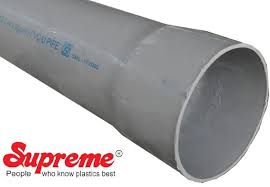PVC Pipes

PVC pipes are plastic pipes made from a synthetic plastic polymer called Polyvinyl Chloride. They are a popular choice for a wide range of applications due to their:
- Durability and Longevity: PVC pipes are known for their long service life and resistance to environmental degradation.
- Corrosion and Chemical Resistance: They don’t rust or corrode and are resistant to many chemicals, making them suitable for various applications.
- Cost-Effectiveness: PVC pipes are generally more affordable than metal pipes in terms of material and installation costs.
- Lightweight and Easy Installation: Their light weight makes them easy to handle and install, reducing labor costs.
- Versatility: PVC pipes are used in water supply, drainage, electrical conduits, irrigation, and more.
- Safety for Drinking Water: Approved PVC pipes are safe for transporting potable water in most countries.
Common Applications of PVC Pipes:
You’ll find PVC pipes used extensively in residential, commercial, and agricultural sectors for:
- Plumbing: Transporting potable (drinking) water, waste water, and other fluids. They are available in various sizes and pressure ratings for different plumbing needs.
- Drainage and Sewage Systems: Efficiently removing wastewater and stormwater from buildings. Their smooth interior helps prevent clogs, and their chemical resistance prevents contamination.
- Electrical Conduits: Protecting electrical wires and cables, providing insulation and mechanical safeguards against moisture, chemicals, and physical damage.
- Irrigation Systems: Transporting water from the source to crops in agriculture and gardening. They are also used in sprinkler and pesticide/fertilizer spraying systems.
- Ventilation Systems: Circulating air and removing stale air, smoke, and fumes.
- Chemical Handling: Transporting various chemicals due to their high resistance to degradation and corrosion.
- Swimming Pools: For water circulation and filtration systems.
- Industrial Process Lines: Carrying various fluids and materials in industrial settings.
- Rainwater Harvesting: Collecting and distributing rainwater for storage and reuse.
- Borewell and Water Well Casing: Providing structural support and preventing collapse in water wells.
Types of PVC Pipes:
While the basic material is PVC, different types are manufactured for specific applications:
- PVC-U (Unplasticized PVC): Also known as rigid PVC, it’s the most common type for water supply, drainage, sewage, and industrial applications. It’s known for its stiffness and resistance to chemical corrosion.
- CPVC (Chlorinated PVC): Can withstand higher temperatures than regular PVC, making it suitable for hot and cold water supply systems and some industrial applications.
- PVC-O (Molecularly Oriented PVC): Manufactured through a process that enhances its strength, stiffness, and flexibility. It’s often used for high-pressure applications like drinking water distribution and irrigation.
- Modified PVC (PVC-M) / High-Impact PVC (PVC-HI): These have impact modifiers added to increase their resistance to external pressure and blows, making them suitable for buried applications and gas distribution in some cases.
- Schedule 40 and Schedule 80 PVC: These designations refer to the wall thickness of the pipe. Schedule 40 is thinner and used for lower-pressure applications, while Schedule 80 has thicker walls for higher pressure and more demanding environments.
- PVC Drain Waste Vent (DWV) Pipes: Specifically designed for drainage, waste, and venting in plumbing systems, with smooth interiors to facilitate flow and prevent blockages.
- PVC Electrical Conduit Pipes: Designed to protect electrical wiring, offering insulation and mechanical protection.
- Agriculture Pipes: Specifically designed for irrigation and water supply in agricultural settings, often with different pressure ratings and sizes to suit various needs.